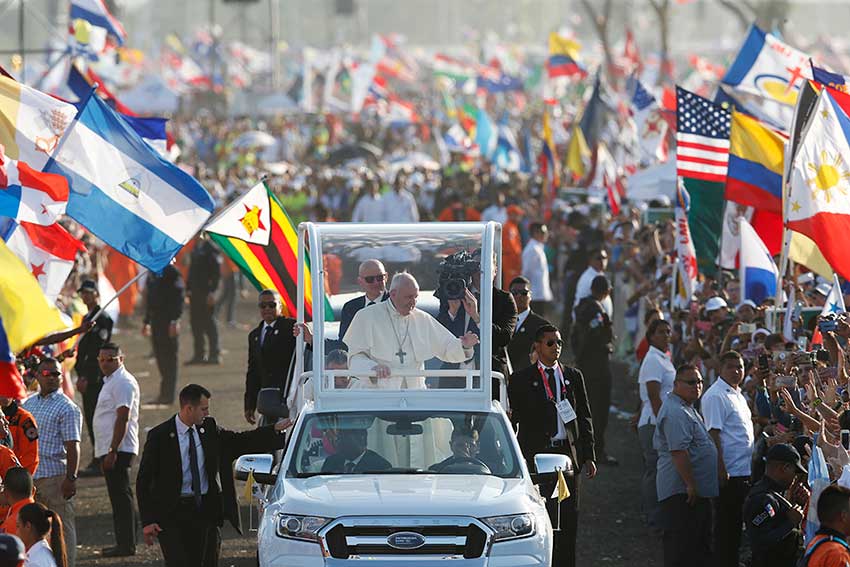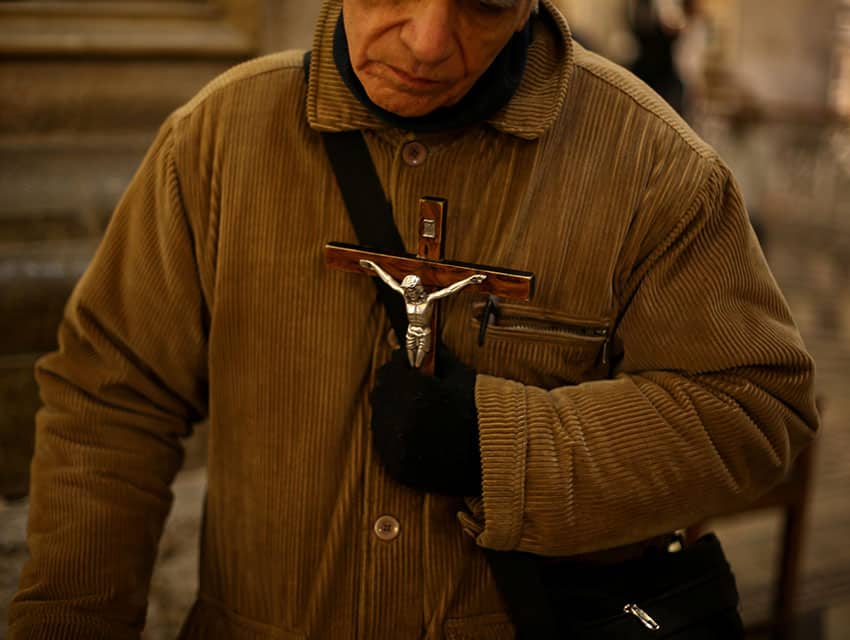
We accept everyone – it sounds so nice. But you can’t be a Christian without repentance and conversion, without the attempt to change your entire life in the light of Jesus and the Gospel …
Increasingly we have been hearing talk within the Catholic community of the hope for ‘an inclusive Church’. This is not a traditional way of understanding the Church. So what does it mean and where has the term come from?
The use of the term ‘inclusive’ in relation to the Church seems to have come from the increasing use of the term in western society.
Over the last ten years the term ‘inclusivity’ or ‘social inclusion’ has become the new buzz word or expression. We are being told that both individuals and organisations must be more ‘inclusive’. It has come to be used along with the expression ‘accepting diversity and difference’. What does this mean?
The meaning of inclusivity or social inclusion, according to accepted definitions, is that of establishing a situation where ‘all individuals and groups in society feel valued and appreciated and can fully participate in society according to their full identity’ without having to alter or modify this identity.
The argument put by those advocating ‘social inclusion’ is that society in different periods has excluded and marginalised individuals or groups that did not meet or conform to the accepted social ideal.
Some of these practices no doubt were unjust, such as the limitations placed on women participating in politics.
The danger associated with the ‘social inclusion’ project is that while trying to address unjust discrimination it fails to recognise that there are some situations where discrimination is acceptable.
For example, the argument put forward during the debates about same sex marriage that ‘love is love’ regardless of gender and sexuality, has the effect of compromising the evident social good of the natural family.

Identity Politics
‘Identity Politics’ is a term used to describes those who, instead of emphasising what we have in common, approach politics in terms of a particular characteristic or trait which they believe has been discriminated against.
Such individual or groups then campaign on the basis of this identity for what they regard as fair treatment. This may include positive discrimination as represented by the demand for quotas to correct long term institutional discrimination for those of a particular identity.
No society has been perfect throughout history. There are a number of examples of individuals or groups with particular characteristics or beliefs who have been treated unjustly. Yet the Church does not subscribe to a conception of justice based on the ideal of social inclusion, rather its ideal of justice is based on the inherent dignity of each person.
Individuals should be judged by their character and not by the colour of their skin or their ethnicity or race, or any other identifying attribute.
The Church is not interested in social inclusion as such, rather it is interested in nurturing the human flourishing of the person. Rather than speak of ‘inclusion’ the Church in its official teaching speaks of the need to establish a just social and political order where everybody is treated according to their human dignity.
Such a just social and political order seeks to eliminate all forms of unjust discrimination or treatment of any person or group because of some particular characteristic, such as sex, race, age, or religious belief. As St Paul says in his Letter to the Galatians (3:28): ‘There is neither Jew nor Greek, there is neither bond nor free, there is neither male nor female: for you are all one in Christ Jesus’.

Call to conversion
The mission of the Church is conversion and transformation of the person, in and through Jesus Christ. It welcomes all to come and hear the message of the Gospel in order to fully embrace a new life in Jesus Christ. It is actually through diminishing our own self-focus that we allow Christ to more fully live in us.
An inclusive Church, on the other hand, implies that it would simply admit individuals as members while not addressing aspects of their life that are out of alignment with Catholic faith and teaching. It would allow them to be included without any demand for conversion.
The origins of the notion of an ‘inclusive Church’ is connected with the demand that the Anglican Church accept those who identified according to genders or sexualities that are inconsistent with orthodox Christian belief.
In 2003, as a response to controversy surrounding appointing a priest in a same-sex sexual relationship as Bishop Delegate to the Anglican diocese of Reading in England, a movement began among Anglican parishes which called for an inclusive church. Indeed, the phrase ‘Inclusive Church’ became the marker of the new movement. The essence of the concept of inclusion is to accept a person as they are, and not require any change as a condition of participation in the life of the Church.
This is, of course, different to being a ‘welcoming Church’ where all are welcome to attend but can only become actual members when they embrace and seek to live by the teaching of the Church.
We note that many Catholic organisations have started to embrace the notion of ‘inclusion’. These organisations, by their nature, engage with the broader community. When a Catholic school, for example, describes itself as inclusive, they mean that they are willing to receive any student no matter what ethnic background or social status.
Catholic schools maintain the tradition of being schools for the poor and are committed to embracing those from disadvantaged backgrounds. Schools have strong policies on the importance of accepting those with various physical or mental disabilities. A number of surveys both here and overseas demonstrate that Catholic schools have been – and continue to be – very successful in promoting tolerance and social cohesion.
But this tradition of seeking to serve all is different to the popular notion of inclusion. It’s about acting according to justice. In this sense, Catholic agencies do better to speak of their commitment to justice and service to all or of a commitment to ending unjust discrimination rather than of being ‘inclusive’.

Reaching those on the margins
Pope Francis is renowned for advocating that the Church should reach out to those on the margins. His image of the Church as a field hospital has attracted much attention.
He has spoken often about the need for pastoral solicitude for those who feel marginalised by the Church, and has singled out particularly the divorced and remarried. However this does not imply simply accepting individuals into the Church who are unwilling to be conformed to Christ and Church teaching.
Often the example of Jesus is presented as being one who advocated inclusion. However Jesus’s primary mission was the proclamation of the Kingdom of God and He urged people to embrace the Kingdom by personal conversion.
Jesus did seek out those considered to be on the margins. However, this was not to simply include them but rather so that they could be changed and converted.
Christian praxis is based on the teaching and example of Jesus. What is clearly evident is that Jesus found a natural place among the ‘tax collectors and sinners’ much to the chagrin of the Pharisees.
He declared that prostitutes and sinners are likely to find their way into the Kingdom of God before the religious elite. His signature teaching found in the Beatitudes spoke of the promise of eternal blessing coming upon those who were poor and meek, those who hungered for justice and those who experienced persecution.

Repent and believe
The Lord told parables of an invitation going out to known and respected people to ‘come to the wedding feast’ but they declined. The parable then tells of the furious Master sending his servants to the highways and byways in order to fill his dining hall.
However one parable on this theme mentions a curious incident. A guest arrives without a ‘wedding garment’ and is excluded. What did the guest lack? Another parable speaks of a group of bridesmaids who had not provided themselves with sufficient oil and were also excluded from the feast.
When the Lord commenced his public ministry he announced that ‘the Kingdom of God is close at hand’. Indeed his whole teaching ministry is premised on this announcement. Following this declaration the Lord outlines the means whereby a person can enter into the Kingdom.
He says that they must ‘repent and believe’. Thus, there are expectations for anyone who wishes to respond. Repentance involves a recognition that there are behaviours that prevent a person from embracing God’s way. To believe suggests that a person needs to embrace God’s promise with expectation. A person cannot simply come on their own terms.
The Lord welcomed sinners and ate with them, but their conversion was always his goal. This is seen in the story of the woman at the well and his encounter with Zacchaeus. To the woman caught in adultery and saved from sure death by the Lord’s intervention, he simply said to her, ‘go and sin no more’.
Thus to enter the Kingdom of Heaven there are expected standards summarised in the requirement for personal conversion and belief.
A new life in Christ
All church agencies should make provision for the disadvantaged and disabled. This should be the distinctive hallmark of any Christian work. But actual participation in the life of the Church requires changes on our part – conversion and a coming to faith.
This is then celebrated by those who were not formally Christian by means of the Sacrament of Baptism, and by those returning to the Church by means of the Sacrament of Penance. Thus, does a person come to new life in Christ.
The Catholic Church certainly welcomes all to come and hear the Good News but conversion is required.
The way of Jesus is difficult, it involves essentially diminishing our own personality and ego so that Jesus may dwell more fully in us. Our hope should not be for a more inclusive Church but one that is more faithful to God’s mission of evangelisation.
Of course, one cannot be properly missionary if one is not committed to justice, so part of this evangelising mission is the need to fight against all forms of unjust discrimination we encounter in our lives.
Related
The Plenary, Catholic doctrine and Catholics for Renewal
Dr Christine Wood on Catechesis: why the Plenary needs to embrace it
Archbishop Julian Porteous is the Archbishop of Hobart in Tasmania
